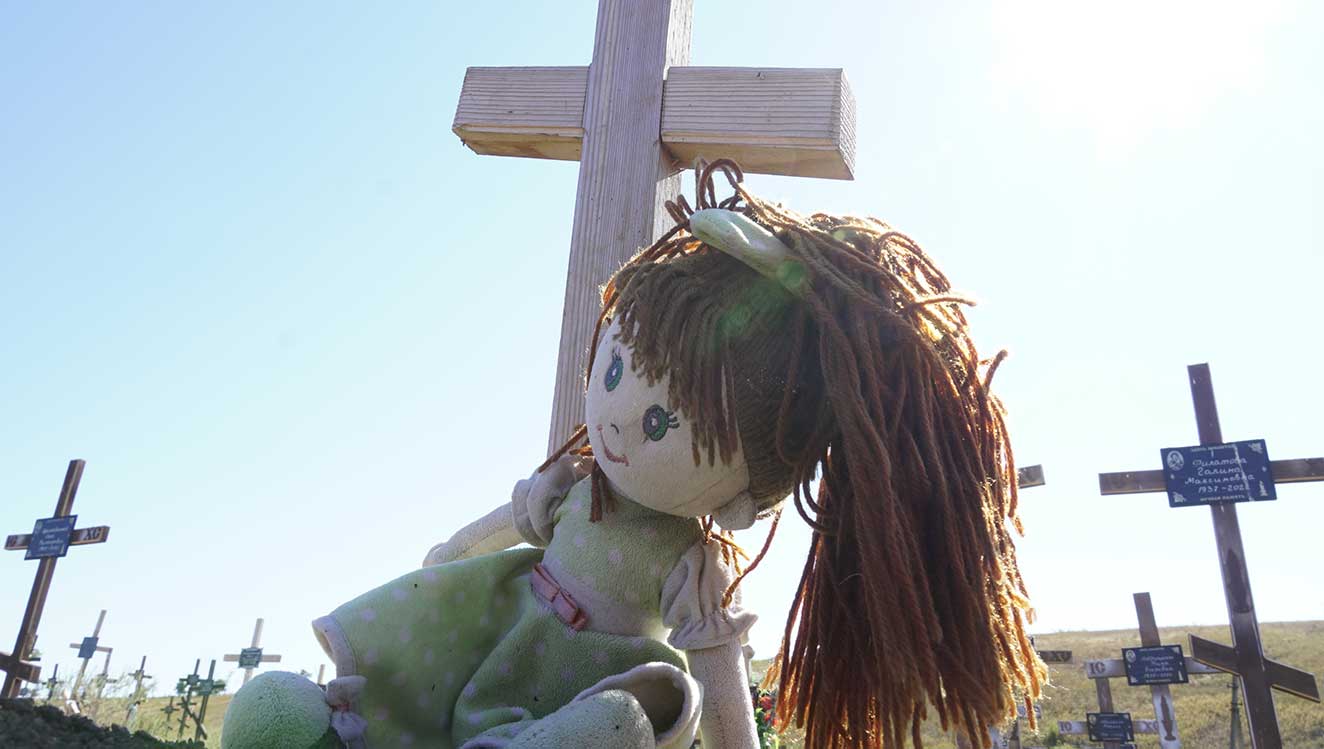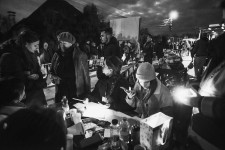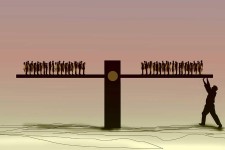Early spring, 2022. The city of Mariupol is besieged and under heavy shelling. In the place where, just yesterday, stood the 4-story building next to their home, there’s nothing but void, after a rocket hit. Yulia and her six-year-old son have no way of leaving the surrounded city, and must take shelter inside the theatre. There are many others there, refuged from the bombs and the rockets, over a thousand people, many children with their moms. All are famished, freezing, and frightened. Then comes March 16, 2022, the day when the Mariupol Drama Theatre turns into the scene of a war crime that would terrify the world.
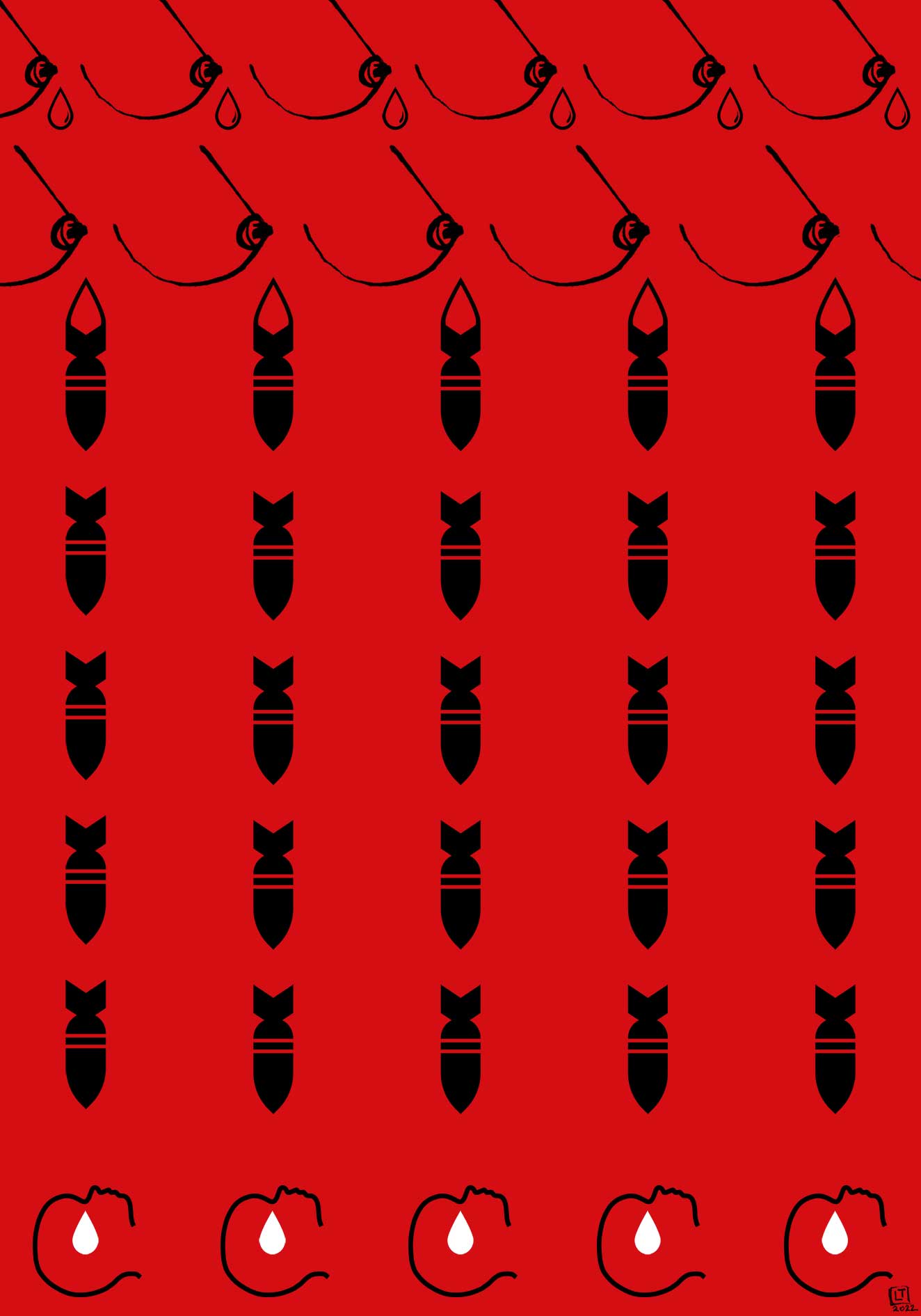
A cage made of smoke
Yulia has her eyes on the sky, gazez worriedly. The plane is hidden by the clouds, she doesn’t see it, but she hears it overflying the theatre and, shortly after, returning.
“This is not the first time it flies like this. Revolving.”
For the past few days, the same, or perhaps another plane, followed the same route, engine roaring like a dark omen: “We see you!”
Yulia knows as much: it is not a matter of if but when the bomb will fall over the theatre. She is determined to leave. Many others want to, but not all of them dare.
In front and the back of the beautiful building, one word lays written, in white paint, large caps: “CHILDREN”.
There are many children among the people who sought refuge from the bombings inside the Mariupol Drama Theatre. For the past two days, they are also the only ones eating something; two cookies every 25 hours. Mikhail, Yulia’s boy, gulped both the second he got them.
From on top of the theatre’s hill, one can see around grey columns of smoke feeding the clouds above Mariupol. Just like a cage. In Yulia’s eyes, an overwhelming despair: “I really don’t get it… I’ll never understand why they bomb our homes!”
For a few days now, rockets and bombs have fallen closer and closer to the theatre. During the long, thundering nights, Yulia hears her car alarm more often. It is parked among hundreds of others, close to the theatre, and the alarm turns on because of the vibrations caused by explosions. She forgot how many times this happened. But every time, she feared. “If anything happens to that car… My God”. Because that car is their only chance to escape.
She could have stopped the alarm remotely, she has an app for it on her phone, but there is no signal in Mariupol. For the past two weeks, the city lacks electricity, internet and natural gas. There has been no more drinking water or food for the past few days. Yulia heard her car alarm at every raid, backing the sound of shelling and shouting instead of the air-raid sirens that were muted so far in Mariupol.
It’s March 14, 2022. Yulia and Mikhail, together with Yulia’s dad and her mother-in-law, will try to leave the city in a 50-car convoy. Nobody knows what awaits on the road ahead, nor if there is a road out. Nobody knows, from the hundreds trying to leave today, if they will manage to leave this hell or die trying.
They only know that the circle tightens while the smoke columns get closer.
Yulia’s hand is shaking as she enters the car. Shaking because of fright, hunger and cold. She turns the key… She tries again. And again. Then she feels her blood freezes in her veins.
She dares try once more—still nothing.
“It’s dead… The battery died… because of the alarm”, she realises, feeling lost.
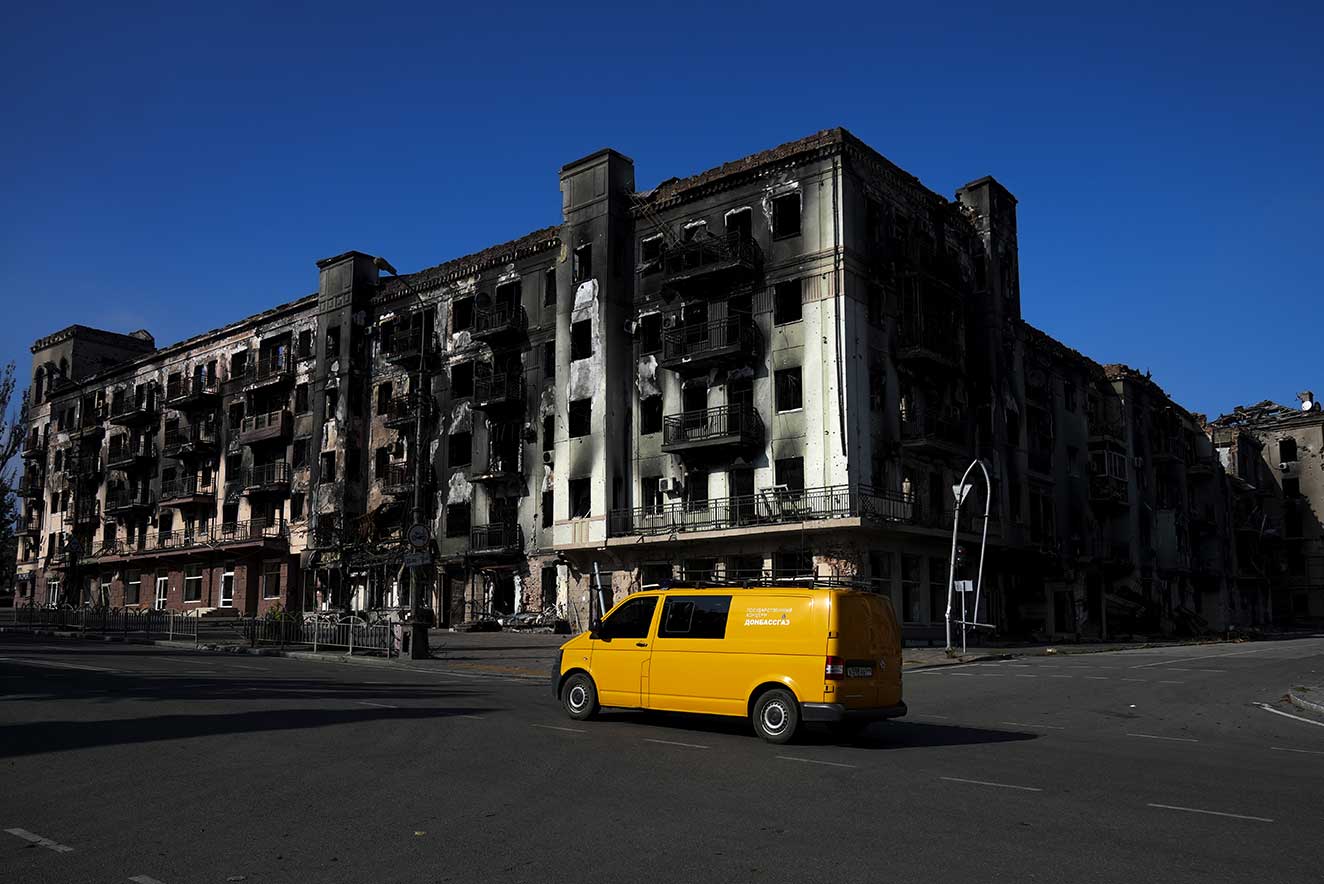
Thursday, when the war began
The young couple bought their apartment in 2015. They loved the old, four-storied multifamily, a few minutes away from the sea. “It was built by the Germans, during the Second World War. It is a robust building, with thick walls. Timeproof.”
This place, three stories up, became the centre of the universe for little Mikhail.
Here is where he babbled his first words, stumbled his first steps, and waited for daddy to come home from the sea for as long as he can remember. Daddy is a sailor. He works for a Greek company, and takes month-long journeys around the world. “Four-month contracts. Then, we’re together for five”.
On Thursday, February 24, 2022, Yulia and Mikhail woke to the sound of explosions. It was just the two of them, Mikhail’s dad was at sea since last Fall. That morning, on the news, on Telegram, everywhere, everybody was off the edge.
“I couldn’t believe it. Bombs were falling all over the country. On group chats, they said that military vehicles were driving around on the streets, with shoot-to-kill orders. That the Russians took Berdyans'k (a city by the Black Sea, west of Mariupol, Ed.). That they come at us from all directions. I was thinking, what, in the name of God, has happened? What world did I wake up to?”
She hoped the thick walls of her house were enough to keep them safe. What else could she do? Her father and mother-in-law came over, both residents of Mariupol.
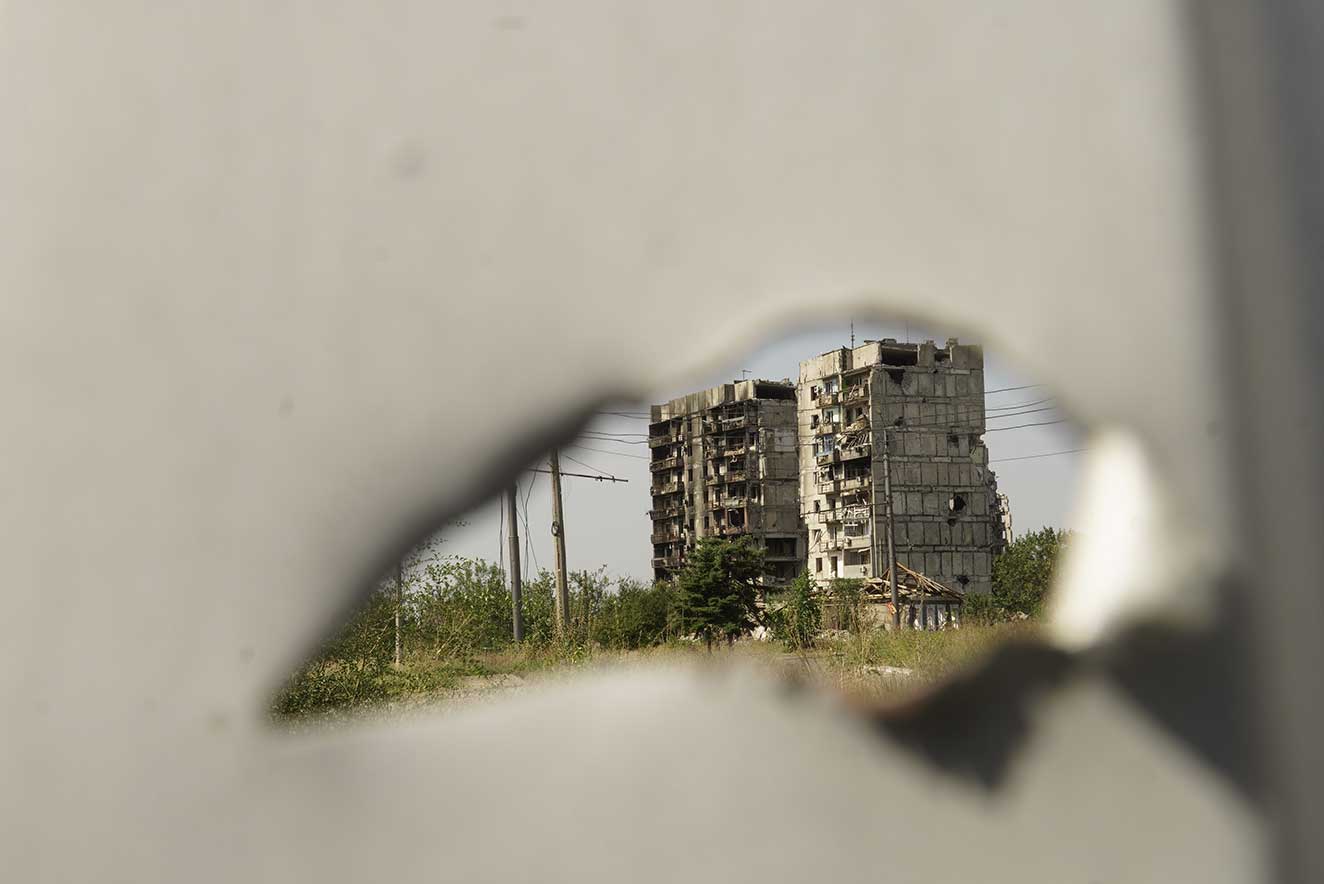
“Up until February 26th, shops, gas stations, they were all open, we could buy supplies, but on the 27th they bombed the city’s main food depot. And the mayor’s house. Then all hell broke loose. They bombed anything.”
They glued adhesive tape on the window glass, so shards won’t spread if they break. Then they glued pillows over the windows and pulled the curtains. They slept in windowless rooms: grandparents in the hallway, Yulia in the bathroom, with Mikhail in a makeshift bed inside the bathtub.
“We slept during the day, when no bombs were falling. From around noon until it got dark, in the afternoon, at 4 or 5”.
On the 1st of March, they stopped the natural gas.
On the 2nd of March, the electricity and internet.
Rumours started to spread about a civilian evacuation. A neighbour came by, and he said he heard it on the radio. Som on the 4th of March, they tried to leave with two cars: her father's car and Yulia’s. They packed a few water canisters, warm clothes, and sleeping bags. Yulia’s dad had this small camping gas cylinder for cooking. “We didn’t even think about the valuables in our apartment. We left everything at home and hurried to leave town”.
When they left the building, they witnessed an unrecognisable place: piles of rubble, buildings in flames, bodies on the streets. Many bodies. “We were shocked when we got out of the door. It didn’t look like the city I grew up in. Everything was burning. And all the dead… It was harrowing”.
They left towards the outskirts but were turned around at a Ukrainian roadblock. “They asked ‘Where are you heading, ma’am?’. I told them we were leaving and that there was an evacuation of the civilians. ‘What evacuation!? There is no evacuation. The city is heavily bombed, you won’t make it to the outskirts. That’s when I asked what we should do. They said we had one option: return home”.
So they returned home.
Yulia’s dad took his car back to the garage, a few streets away. He was rather low. He mauled one of his tyres on the road debris. “I got to the apartment before he did. I waited for an hour. He was already late, I started being nervous. Very nervous. I wanted to go out, look for him, but the thought I might go, but not be able to turn back to Mikhail… I couldn’t leave my son.”
Eventually, Yulia’s dad returned. Tachycardic. Breathing heavily, scared. A rocket fell close to the garage, and the blast threw the old man to the ground. He only suffered mild injuries, thankfully.
But that night, the one between the 5th and the 6th of March, it felt like all hell broke loose in Mariupol. “They were continuously firing rockets. ‘What is the point of this? Why are they firing at us?’, I kept asking my dad… I didn’t think we would survive”.
That morning, before dawn, a rocket hit the neighbouring building. “It just wasn’t there anymore. Like nothing was ever there before. There was just a void in its place”.
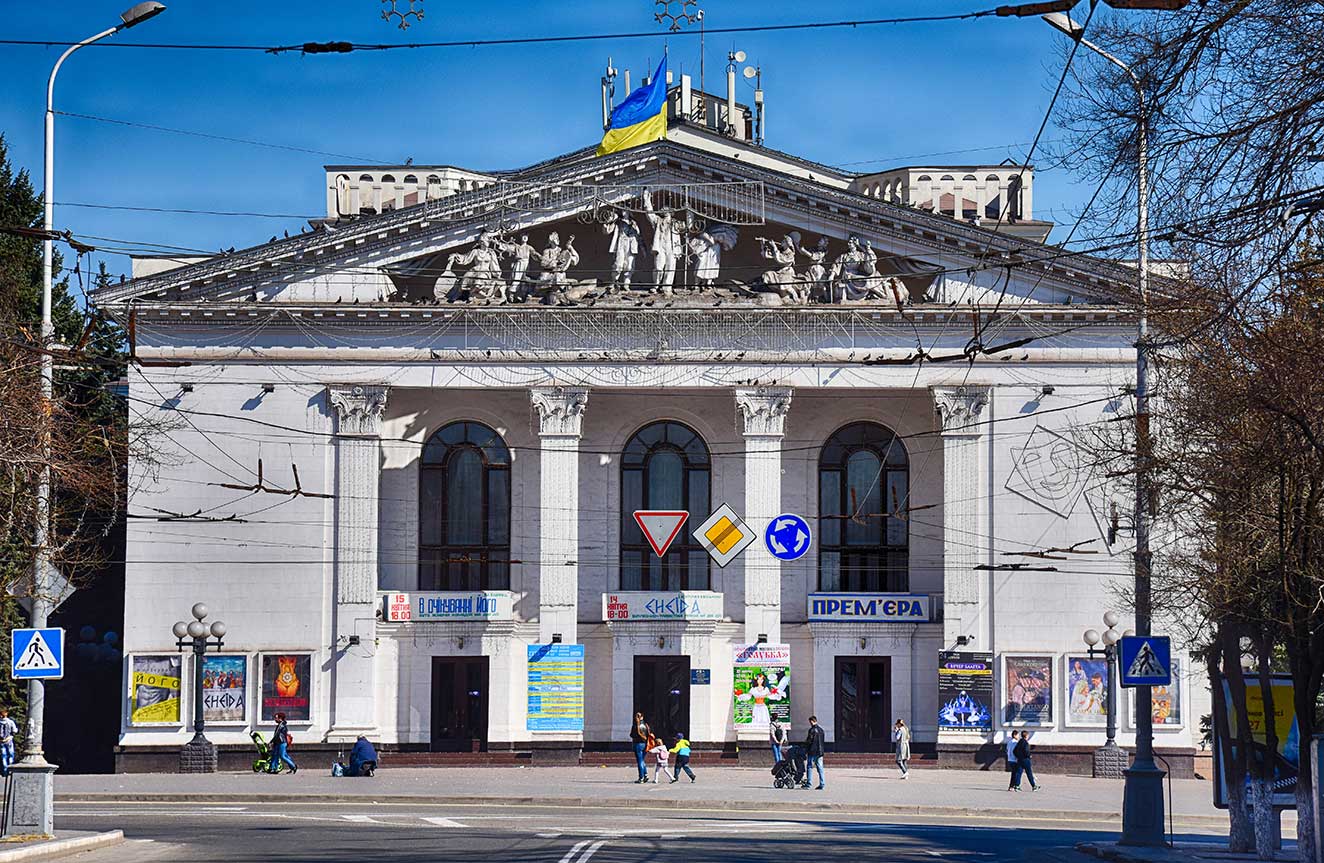
The final lowering of the curtain
The theatre was on their way, but it wasn’t where they planned to stop. They wanted to leave the city as fast as possible. This pile of rubble that just ten days before was one of the most beautiful cities in Ukraine.
They decided to go by the theatre to avoid meeting the soldiers who had sent them home a day before. But when they got to the theatre square, they were again stopped. This time, there were many cars and a lot of people. The square was one huge parking lot. They would have turned around to try another route, but explosions were thundering from behind—columns of smoke.
“This is it, people! No further!” a policeman was shouting. They tried to convince him that they wanted to leave town, that a rocket fell close to their home, and that they feared for their lives. The officer pointed to the crowd: “You and all the others.”
There were already a lot of people inside the theatre. Yulia estimates more than 600 souls. The theatre manager and some actors were trying to keep order by telling newcomers where to go, where to take their mattresses, and how things work. During the following days, hundreds more people would crowd into the Mariupol theatre: “Everybody in the city knew the theatre is old and has an air-raid shelter.”
Yulia and Mikhail received three pillows taken off the performance hall chairs. This was their bed, they both had to manage. Her dad and mother-in-law had to sleep standing. “We were very crowded and had no room. We were too many!”
Mikhail was spending his time listening to stories told by his grandmother, playing some games and drawing.
Two days later, on March 7th, they heard the first planes, and a bomb fell nearby. All the windows broke. The actors used theatre sets and removed the main stage curtain to cover the broken windows and keep the cold out. It was -5°C during the night. „They cut part of the curtain to make blankets for the children. There were many children.”
It was then when, Yulia remembers, the actors painted the word they believed would protect them on the pavement: „CHILDREN”.
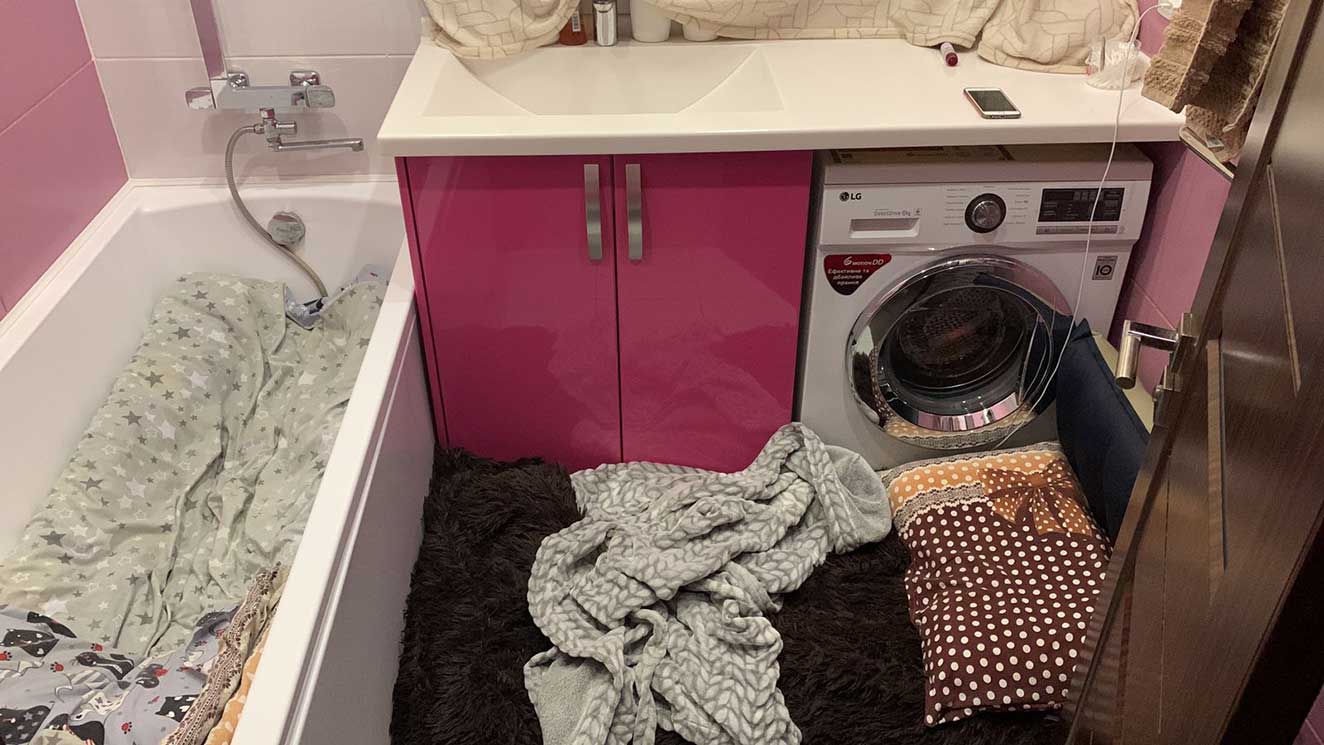
“We would have died on March 9th.”
They were struggling to feed over a thousand mouths inside the makeshift kitchen, cooking at a fire of furniture, veneer, cardboard and whatnots. Inside, the kettles boiled leftovers that men would scavenge from abandoned shops and supermarkets. Once a day a truck brought drinking water. It was probably sent by the City Hall. Time was running incredibly slow. More people arrived, and the kettles were getting lighter.
“They organised us into three categories. The first to eat were the ones who cooked, helped make the fire and cleaned the toilets. Then the children and older people. The others, we only ate if anything was left.”
Yulia already spent three nights at the theatre when they met a neighbour who told them their home was destroyed by bombs. “He told us three bombs fell on the building! Three! All that was left was the front wall… He told us that if we had decided to stay at home, we would have died on March 9th”.
Artillery fire became more intense. The next day a rocket fell inside the kitchen. “A girl was taken to the hospital. She was unconscious. There were three other wounded.”
Starting March 11, the water truck stopped coming, and food was nearly over. Yulia, the two grandparents and Mikhail had to share 100 grams of soup and two cookies per day. During the last couple of days, nobody received anything to eat. Except for the kids: two cookies.
It was then that they decided to leave, no matter what.
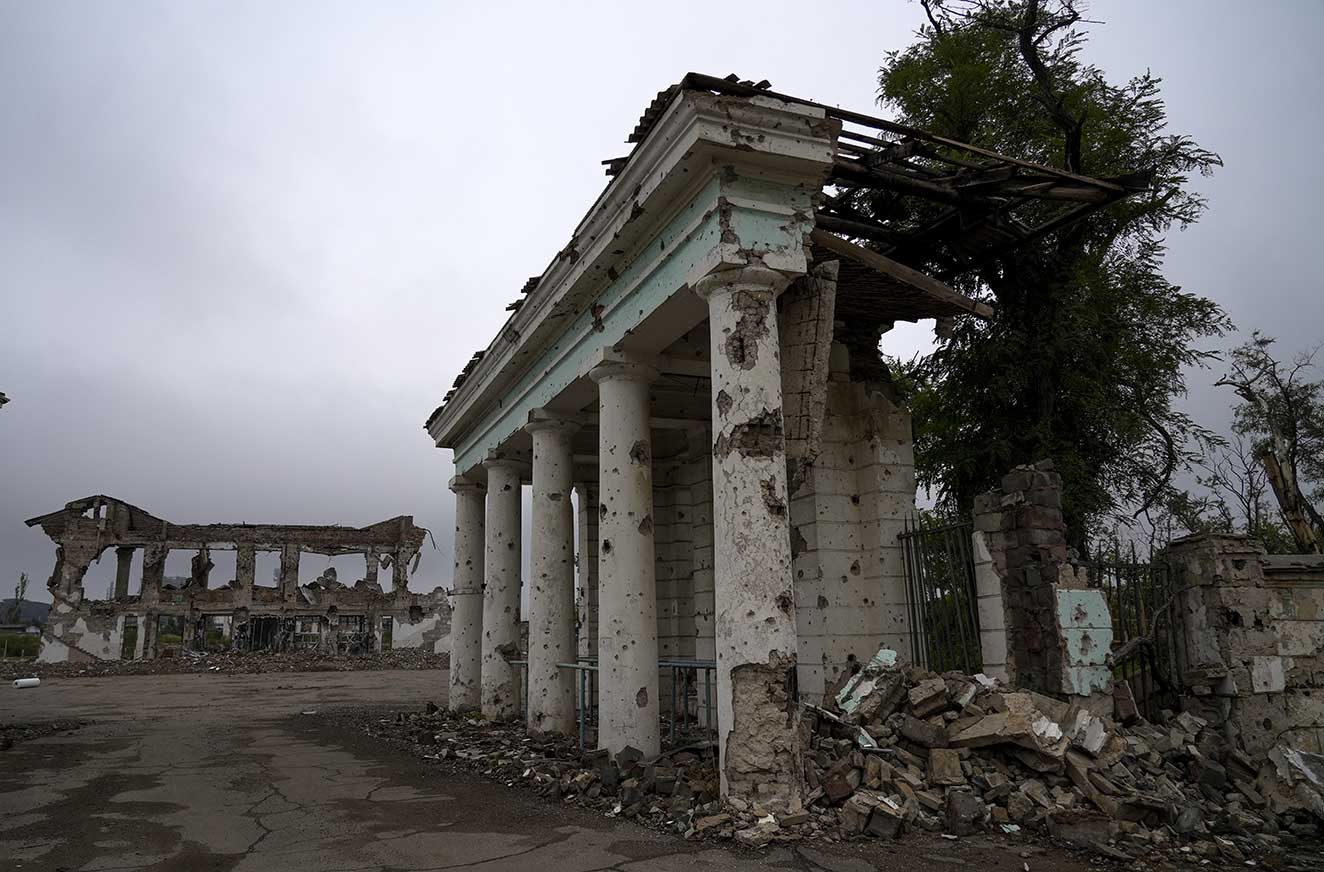
The 20 doors out of hell
It is 9 in the morning, the 14th of March. A 50-car civilian convoy is about to leave the theatre square. A plane engine can be heard above. This is the second convoy leaving Mariupol, another left yesterday. Nobody has any news from those people, nobody knows whether they made it out, or if they survived.
Yulia’s hand shakes while she uselessly turns the key to start the engine. She is hungry, hasn’t eaten anything in two days, and feels immensely frustrated, angry and terrified. She gets out of the car, desperately hurries among the rest of the cars, engines whirring. “Who’s got a cable? I need a cable! Who’s got a cable?”
Few things made her as happy as her car’s engine that day, the moment it started.
Moments after, the convoy stirs toward Manhush, a village 20 kilometres away from Mariupol. West. At the first roadblock, they see the soldiers stopping them are no longer Ukrainian soldiers, but Chechen soldiers, Kadyrov’s troops, allied with the Russians:
“Where are you heading?”
“To Zaporizhzhia”
“Go to Berdyans'k. It’s Russia there already. Quiet. Peace.”
“No, no! I go to Zaporizhzhia.”
“Go. But in three days, Zaporizhzhia will also be Russia.”
Then comes the second roadblock, where a soldier erases all the pictures they took after the 24th of February. All the messages, all the posts, everything. They ask Yulia to give an interview saying the Ukrainian army abandoned them. She refuses.
Along the 20-kilometre line to Manhush, there were 20 roadblocks. They were stopped, interrogated, and checked 20 times. However, Yulia notices her phone has signal again, so she tries to call her husband. Her heart jumps a beat when she finds out he wrote his resignation to quit his job and enrol in the army. He saw the news and saw their home bombed on the 9th of March. He thought Yulia and Mikhail were dead.
“No, no, no! Don’t do this! Stay there! Don’t do this, don’t come here! We’re OK!. We’ll get away!”
When they reach the 20th roadblock, it is already afternoon.
“What am I to do with you?”, the soldier asks. He is Russian.
“What do you mean? Let us pass. We need to get to Zaporizhzhia.”
“You won’t make it by day. After sunset, we have orders: shoot to kill. It doesn’t matter if you are soldier or civilian. Stay here, it is dangerous.”
“In two hours we reach Zaporizhzhia. Before sunset.”
Faltering, he allows them to pass. Yulia drives by three Red Cross trucks which were stopped from entering Mariupol. After reaching the village of Manhush, the convoy disperses. Many choose to spend the night, but Yulia continues towards Zaporizhzhia. She will get there in two hours. She’ll make it. It is a road she knows all to well. “It is the road to the airport.” Many times, she drove on this road before with Mikhail to wait for “daddy”.
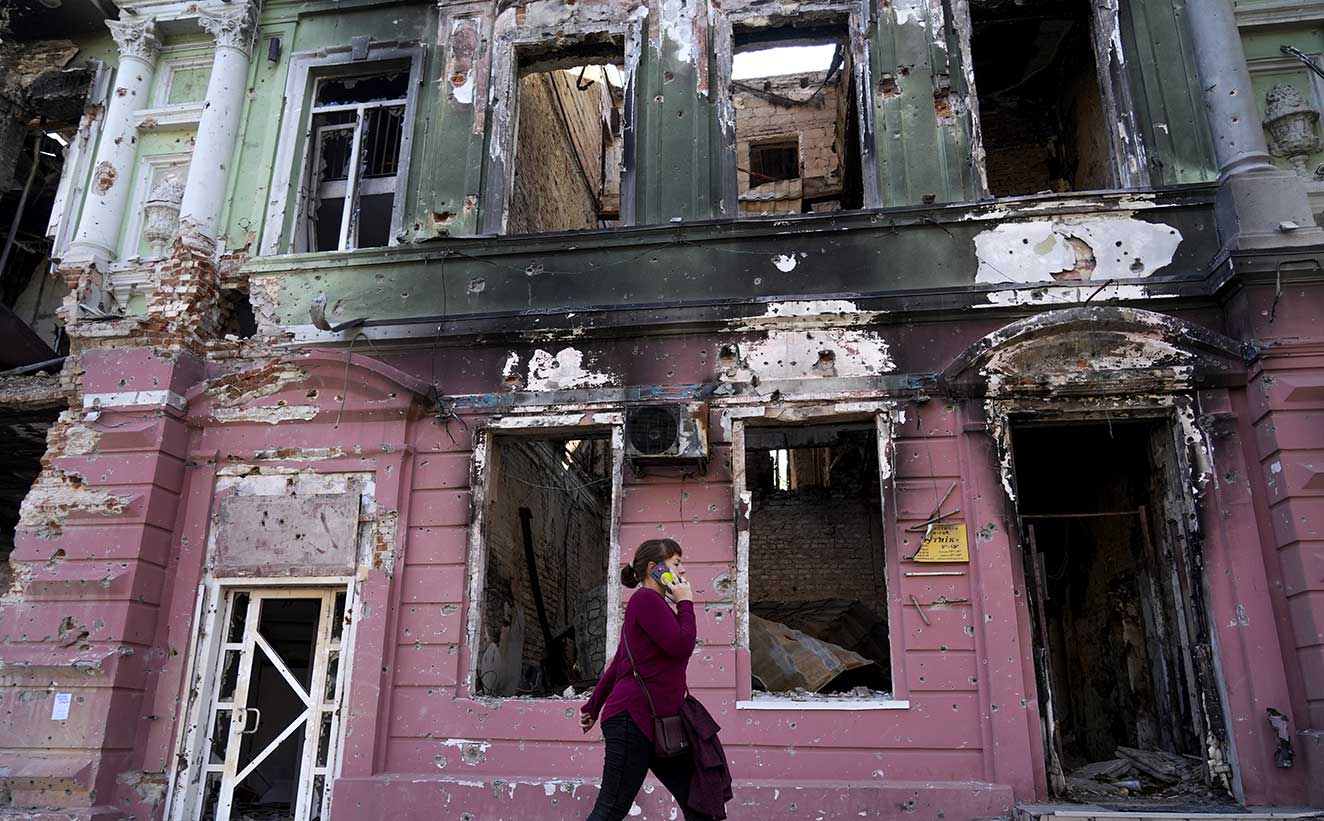
Yulia, Mikhail and the two grandparents safely got to Zaporizhzhia before nightfall. After entering the city, Ukrainian soldiers escorted them to a centre for refugees. While she clearly remembers each of the 20 days spent in the besieged Mariupol, under heavy bombing and rocket fire, Yulia’s memory of that moment in Zaporizhzhia is faded. “It felt like a dream. We escaped hell, but in Zaporizhzhia life was normal: shops were open, people were walking casually on the street, doing groceries.”
They spent that night in a kindergarten and left the next day farther west, to Dnipro, in the country's centre.
On March 16, 2022, Russia dropped a 500-kilogramme bomb on the Mariupol Drama Theatre. How many people died during the explosion is unclear, but some estimates reach 600. Following this war crime, people lit candles before many of the world’s theatres, candles in the shape of a word that should have kept bombs away: “CHILDREN”.
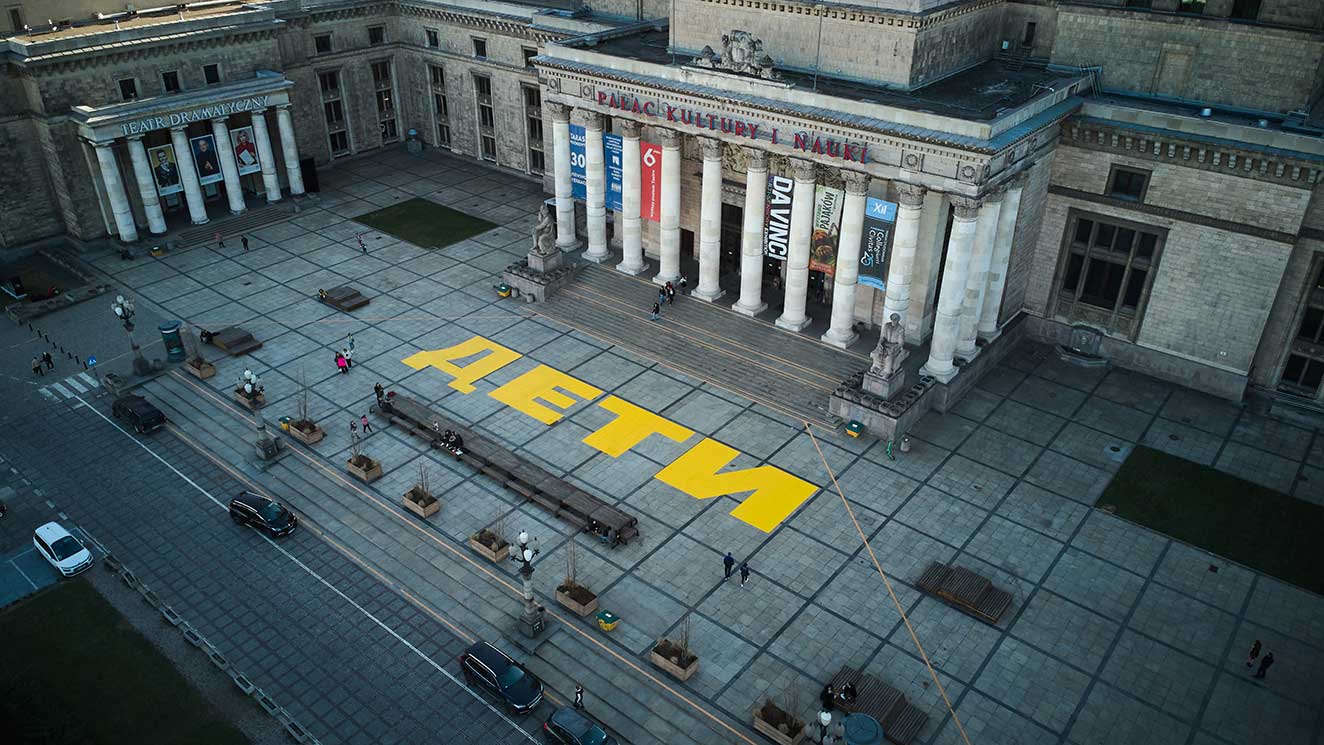
Epilogue: Far away from the sea
One week later, bombs fell in Dnipro, where Yulia and her family settled. They then talked over the phone with some close friends who reached Cluj, Romania, a city far away from bombs but also far away from the sea.
“I feel lost. I don’t know what to do with my life. It is nothing but uncertainty. Back home we had everything we needed. We were truly happy with our lives. Now we have nothing.”
They chose to look for happiness in the small things. To cherish the time spent together.
“When we got to Cluj, Mikhail was sitting closed inside the locker, playing on his phone. Now he is better, but he still startles whenever he hears a plane. He likes to go out in the city centre, especially after he found out he has the same name as the church there (Saint Michael, Ed.). He loves chasing pigeons. But the best moments are when his dad returns from the sea.”
